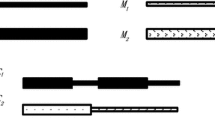Abstract
Recently, the shared center (SC) problem has been proposed as a mathematical model for inferring the allele-sharing status of a given set of individuals using a database of confirmed haplotypes as reference. The problem was proved to be NP-complete and a ratio-2 polynomial-time approximation algorithm was designed for its minimization version (called the closest shared center (CSC) problem). In this paper, we consider the parameterized complexity of the SC problem. First, we show that the SC problem is W[1]-hard with parameters d and n, where d and n are the radius and the number of (diseased or normal) individuals in the input, respectively. Then, we present two asymptotically optimal parameterized algorithms for the problem.
Access this chapter
Tax calculation will be finalised at checkout
Purchases are for personal use only
Preview
Unable to display preview. Download preview PDF.
Similar content being viewed by others
References
Chen, Z.-Z., Wang, L.: Fast exact algorithms for the closest string and substring problems with application to the planted (L,d)-motif model. IEEE/ACM Transactions on Computational Biology and Bioinformatics 8(5), 1400–1410 (2011)
Chen, Z.-Z., Ma, B., Wang, L.: A three-string approach to the closest string problem. Journal of Computer and System Sciences 78, 164–178 (2012)
Doi, K., Li, J., Jiang, T.: Minimum Recombinant Haplotype Configuration on Tree Pedigrees. In: Benson, G., Page, R.D.M. (eds.) WABI 2003. LNCS (LNBI), vol. 2812, pp. 339–353. Springer, Heidelberg (2003)
Downey, R.G., Fellows, M.R.: Parameterized Complexity. Monogr. Comput. Sci. Springer, New York (1999)
Gramm, J., Niedermeier, R., Rossmanith, P.: Fixed-parameter algorithms for closest string and related problems. Algorithmica 37, 25–42 (2003)
Impagliazzo, R., Paturi, R., Zane, F.: Which problems have strongly exponential complexity? J. Comput. System Sci. 63, 512–530 (2001)
Leykin, I., Hao, K., Cheng, J., Meyer, N., Pollak, M.R., Smith, R.J.H., Wong, W.H., Rosenow, C., Li, C.: Comparative linkage analysis and visualization of high-density oligonucleotide snp array data. BMC Genetics 6, 7 (2005)
Li, J., Jiang, T.: An exact solution for finding minimum recombinant haplotype configurations on pedigrees with missing data by integer linear programming. In: Proceedings of Symposium on Computational Molecular Biology (RECOMB), pp. 20–29 (2004)
Li, J., Jiang, T.: Computing the minimum recombinant haplotype configuration from incomplete genotype data on a pedigree by integer linear programming. Journal of Computational Biology 12(6), 719–739 (2005)
Ma, W., Yang, Y., Chen, Z.-Z., Wang, L.: Mutation region detection for closely related individuals without a known pedigree. IEEE/ACM Transactions on Computational Biology and Bioinformatics 9, 499–510 (2012)
Ma, B., Sun, X.: More efficient algorithms for closest string and substring problems. SIAM Journal on Computing 39, 1432–1443 (2009)
Marx, D.: Closest substring problems with small distances. SIAM Journal on Computing 38, 1382–1410 (2008)
Sellick, G., Longman, C., Tolmie, J., Newbury-Ecob, R., Geenhalgh, L., Hughes, S., Whiteford, M., Carrett, C., Houlston, R.: Genomewide linkage searches for mendelian disease loci can be efficiently conducted using high-density snp genotyping arrays. Nucleic Acids Res 32(20), e164 (2004)
Wang, L., Zhu, B.: Efficient Algorithms for the Closest String and Distinguishing String Selection Problems. In: Deng, X., Hopcroft, J.E., Xue, J. (eds.) FAW 2009. LNCS, vol. 5598, pp. 261–270. Springer, Heidelberg (2009)
Xiao, J., Liu, L., Xia, L., Jiang, T.: Fast elimination of redundant linear equations and reconstruction of recombination-free mendelian inheritance on a pedigree. In: Proceedings of ACM-SIAM Symposium on Discrete Algorithms (SODA), pp. 655–664 (2007)
Zhao, R., Zhang, N.: A more efficient closest string algorithm. In: Proceedings of the 2nd International Conference on Bioinformatics and Computational Biology (BICoB), pp. 210–215 (2010)
Author information
Authors and Affiliations
Editor information
Editors and Affiliations
Rights and permissions
Copyright information
© 2012 Springer-Verlag Berlin Heidelberg
About this paper
Cite this paper
Chen, ZZ., Wang, L., Ma, W. (2012). The Parameterized Complexity of the Shared Center Problem. In: Kärkkäinen, J., Stoye, J. (eds) Combinatorial Pattern Matching. CPM 2012. Lecture Notes in Computer Science, vol 7354. Springer, Berlin, Heidelberg. https://doi.org/10.1007/978-3-642-31265-6_35
Download citation
DOI: https://doi.org/10.1007/978-3-642-31265-6_35
Publisher Name: Springer, Berlin, Heidelberg
Print ISBN: 978-3-642-31264-9
Online ISBN: 978-3-642-31265-6
eBook Packages: Computer ScienceComputer Science (R0)




